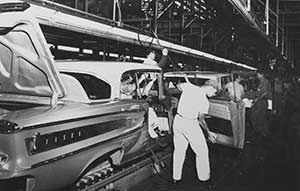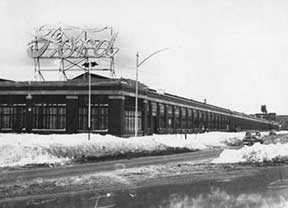
By William C. Shelton
(The opinions and views expressed in the commentaries and letters to the Editor of The Somerville Times belong solely to the authors and do not reflect the views or opinions of The Somerville Times, its staff or publishers)
For the second time in as many years, Assembly Row has won Curbed Boston’s Neighborhood of the Year award. The folks at Federal Realty Investment Trust should be justly proud of what they have accomplished.
And they would willingly acknowledge that the sometimes contentious interactions among developers, city officials and community activists have contributed to the high quality of Assembly Row’s public realm.
Few who enjoy that public realm today know that 35 years ago an Assembly Square development proposal produced a municipal corruption scandal that tarnished the city’s reputation, but ultimately resulted in significant improvements to its political culture.

The Edsel plant’s assembly line in 1957.
During the first half of the last century, Assembly Square was a thriving industrial center, manufacturing machine tools, confections, clothing, ceramics, and appliances; and distributing petroleum, dry goods, groceries, and structural steel.
In 1926, Ford built an assembly plant, from which the Square took its name. The next year, First National Stores (FINAST), the nation’s first supermarket chain, built a warehouse complex and its headquarters across Foley Street from the Ford facility.
But deinustrialization came early to Somerville. The Ford plant’s 1958 closure heralded a wave of shuttered factories. By 1976, Assembly Square was becoming a ghost town. FINAST, the B & M Railroad, and Ford had each paid the city over $1 million in annual taxes, but were gone. Two machine tool companies and a trucking concern were the only large employers left.
Albert Kahn, America’s foremost industrial architect, had designed the Ford plant. Through large windows on Middlesex Avenue, pedestrians could view the Edsel assembly-line operation.
In 1978, East Bay Development Corporation promised to turn the plant into a mall, renovate the office building that had been FINAST’s headquarters, build a 200-to-400 room hotel, develop ten additional acres of commercial and office property, and create 1,450 permanent jobs. The city embraced the proposal as its Assembly Square Redevelopment Plan and obtained a $3.3 million HUD grant to build the road improvements that the developer wanted.
East Bay had built the Woburn mall and several others. In the process, the FBI caught them in a securities-fraud and tax-evasion scheme. East Bay’s principal, Ray Coots, told then U.S. Attorney Bill Weld that in return for reducing or dropping charges, he could deliver corrupt Somerville politicians.
Conducting the sting required an operative who would not be recognized in Somerville. Special Agent John Connolly, who ended up going to prison for colluding with Whitey Bulger, recommended Special Agent Jack Callahan, his former Boston College classmate.
They introduced Jack Callahan to Somerville as Jackie Collins, East Bay’s public- and government-relations officer. Their intention was to catch a low-level politician, offer leniency in return for cooperation, and work their way up the food chain.
The fictional hotel’s restaurant needed a liquor license, but Somerville had recently frozen the number of on-site licenses at 52. A new license would require legislation by the Board of Aldermen and a home-rule petition passed by the Legislature.
Callahan wined and dined Ward 1 Alderman Tim Creedon, who said that he could get the legislation passed, but it would “cost” East Bay. Callahan gave Creedon $13,500. Creedon gave $500 each to five other aldermen. The only one who he later named was Ward 3 Alderman Michael McKenna, who had complained that he should get at least $1,000.

The Ford plant’s exterior from the earlier 1950s.
Vinny Piro was then riding high as Somerville and Medford’s powerful State Representative on the Ways and Means Committee. Callahan asked Piro to shepherd the home rule petition through the statehouse.
Piro said that it would cost $25,000. As proof of his good intentions, he told Callahan that he had taken two bribes for successfully rendering favors in the past. In March 1983, the FBI recorded Piro telling Callahan that he “needed a little walking-around money” to “grease a few guys.” They gave him $5,000 in marked bills.
At that time, city tax assessors were elected rather than appointed. The department was notorious for the bribes that assessors took to reduce property assessments. Assessor Robert Campo knew a good thing when he saw it. He went to Callahan and told him that he “needed some help,” because his campaign costs had been high.
In return for $5,000, he reduced the mall’s tax assessment. Over the next two years, he solicited two more bribes, and the FBI recorded 47 conversations with him, including three involving his son-in-law, Alderman McKenna. He later testified that he had shared the bribes with other assessors.
Campo ended up pleading guilty and received a three-year sentence. Creedon got a one-year sentence in Danbury for cooperating, and was paroled six months later. Suffering from brain cancer, McKenna was given house arrest.
Piro’s attorney argued that his client had been entrapped, and pointed out that he had returned the $5,000 three weeks after taking it. Prosecutor John Pappalardo said that Piro had been tipped off, and that the currency he returned was different from what he had been given.
Piro’s first trial ended in a mistrial, and his second, in an acquittal. But Somerville voters convicted him at the polls. He had won the Democratic primary election for the State Senate and faced no Republican opponent. In the general election, outraged voters elected Alderman Sal Albano in an unprecedented write-in campaign. Shortly thereafter, the Board of Alderman abolished the election of assessors.
The mall did not stimulate a wave of new development. During the period of its greatest popularity, it had the highest incidence of car theft of any location in the Commonwealth. A decade after it opened, it began a decline that would end with its closing.
In 1998 a new group of developers bought the mall property. Their proposal to build a giant new Home Depot, along with grossly unethical practices by one of their partner firms, provoked a bitter struggle with community activists who included myself.
In 2004 they sold their interest in the property to Federal Realty, whom we found to be people of integrity and goodwill. The 2006 agreement that we mutually negotiated has brought many benefits, including the Orange Line station, in which Federal Realty was the first investor.
Federal promised to create an urban village on the Mystic River. I believe that the results speak for themselves.












The great twist in the story was how Vinny discovered that “Jackie Collins” the East Bay bag man was an FBI agent. According to one source, Vinny, a BC Grad was at a BC football game with friends when across the sadium he noticed “Collins”. He pointed him out to his friends as a developer. One of the friends said “He’s no developer, he’s an FBI agent, we graduated from BC together.” And so the money was returned.
It would have been so fine to see Vinny’s face at that moment.
Interesting story. I wonder how much of this corruption culture lives on in Somerville. I have to imagine that it still persists, but people are more careful in their ways.
Members of the community collaborating on development with it resulting in a successful (although corporate-retail heavy) urban village? What a concept 😉